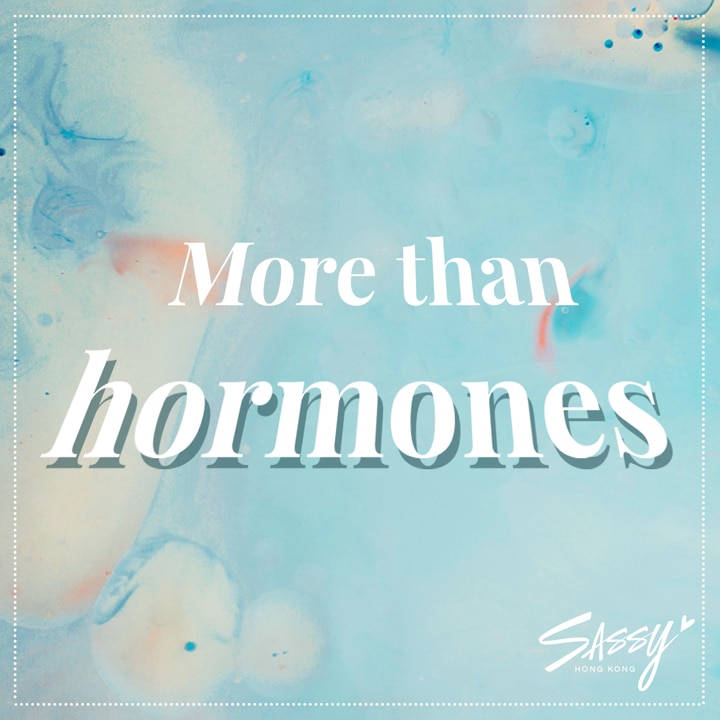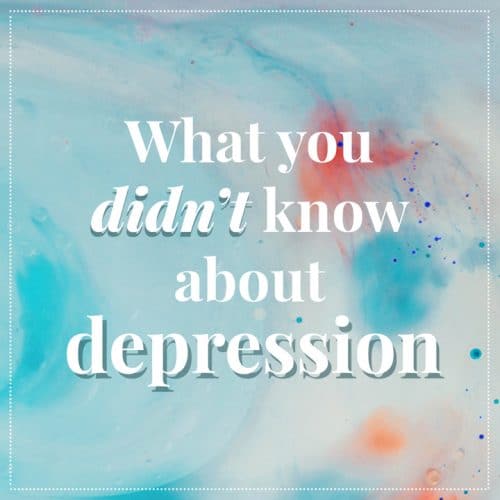Depression is the number one cause of poor health and disability worldwide; the World Health Organisation estimates that over 300 million worldwide have depression. It commonly co-occurs with other conditions, especially anxiety. In Hong Kong, the most common mental health problem is mixed anxiety and depressive disorder, affecting 6.9% of adults.
6 Facts Worth Knowing About Depression

Social, biological, genetic, and environmental factors all matter
There is no single cause of depression. A person’s risk of developing depression is based on a combination of biological, genetic, social, and environmental factors. Relationships, physical health problems, genetic predisposition, and adverse life experiences are just a few of the factors that can contribute.
In Hong Kong, workplace stress is a significant risk factor, as we have some of the longest working hours in the world (we average 50 hours per week at work) and 64% of locals report to have at least one dimension of work-related stress. In fact, a quarter of the working population in Hong Kong show some symptoms of depression and anxiety, which is about 2.5 times the global average.

Depression is more than emotional distress
Depression is more than emotional distress. Physical and behavioural symptoms, such as changes in sleep patterns, gastrointestinal issues, weight loss/gain, headaches, back pain, and appetite changes are as indicative of depression as more well-known emotional symptoms.

Women are twice as likely to experience depression
Women are more susceptible to depression, especially in the perinatal period. According to Postpartum Depression: A Public Health Problem, around 1 in 10 women in Hong Kong develop depression after giving birth. Depression and anxiety can affect men and women at any age, but the risk increases for women during their pregnancy and in the year following.
It can be easy to see this as purely a chemical response to body and hormonal changes, but research shows that postpartum depression is due to a combination of both hormonal and social changes. Whilst this isn’t something that should cause unnecessary worry, it is something women and men should keep in mind.

Regular exercise can reduce depression by almost 20%
Exercise and physical activity – be it a short walk, yoga session or kickboxing class – is beneficial in both preventing and treating depression. Exercise increases serotonin and endorphins, which help regulate and improve your mood. Increasing activity levels from nothing to exercising regularly (three times a week) can reduce your risk of depression by almost 20% and even help alleviate your symptoms.
Depression can physicalise itself by causing disrupted sleep, reduced energy, body aches and increased pain perception which, naturally, can result in less motivation to exercise. This can be a vicious cycle – and a hard one to break – but it’s important to remember that getting started is the toughest part. Once a routine is set, the benefits of exercise should be enough to encourage you to to keep going (fingers crossed!).

Recovery is possible
Depression is treatable and you can completely recover from it. An estimated 70-90% of people with mental health problems (who access appropriate experience symptom relief) are able to continue living healthy and satisfying lives.
Medication and talk therapy are two of the most common and effective forms of treatment for depression, though the effectiveness varies from person to person. For one, people react differently to different types of antidepressants. It may take a few weeks or months to find the appropriate type, dosage, combination, or alternative treatment.
More than one type of antidepressant, talk therapy, or a combination of both (Frontiers in Behavioral Neuroscience), may be the answer. In one study, almost 50% of treatment-resistant depression cases who received Cognitive Behavioural Therapy (CBT) reported at least a 50% reduction in symptoms of depression. Alternative and complementary treatments include exercise, ecotherapy, mindfulness, Electroconvulsive therapy (ECT) and transcranial magnetic stimulation.
If you’re in need of more information, please speak to your family doctor or a clinical professional about treatment options.
Editor’s note: This post was written to raise awareness about mental health. If you’re in need of immediate support, please call The Samaritans 24-hour Helpline (+852 2896 0000).
6 Facts Worth Knowing About Depression

6 Facts Worth Knowing About Depression
Clinical depression isn’t always black and white, and there’s still a lot to learn.
Depression is a common mental health problem affecting people from all walks of life. It can impact people’s ability to work, study, and spend time with their friends and family the way they would like to. Depressive disorder is more than feelings of sadness, grief, frustration or disappointment – it can result in long-lasting symptoms such as loss of energy, loss of appetite, a lack of interest and overwhelming sadness. If left untreated, depression can lead to serious health complications. Whether you’re diagnosed with clinical depression yourself, or you’re looking to support others, the first step is to educate yourself to avoid common misconceptions. Here are 6 facts about depression to help you gain a better understanding of the mental illness…
Read more: 8 Things You Can Do For Your Mental Health
Depression is the number one cause of poor health and disability worldwide; the World Health Organisation estimates that over 300 million worldwide have depression. It commonly co-occurs with other conditions, especially anxiety. In Hong Kong, the most common mental health problem is mixed anxiety and depressive disorder, affecting 6.9% of adults.
There is no single cause of depression. A person’s risk of developing depression is based on a combination of biological, genetic, social, and environmental factors. Relationships, physical health problems, genetic predisposition, and adverse life experiences are just a few of the factors that can contribute.
In Hong Kong, workplace stress is a significant risk factor, as we have some of the longest working hours in the world (we average 50 hours per week at work) and 64% of locals report to have at least one dimension of work-related stress. In fact, a quarter of the working population in Hong Kong show some symptoms of depression and anxiety, which is about 2.5 times the global average.
Depression is more than emotional distress. Physical and behavioural symptoms, such as changes in sleep patterns, gastrointestinal issues, weight loss/gain, headaches, back pain, and appetite changes are as indicative of depression as more well-known emotional symptoms.
Women are more susceptible to depression, especially in the perinatal period. According to Postpartum Depression: A Public Health Problem, around 1 in 10 women in Hong Kong develop depression after giving birth. Depression and anxiety can affect men and women at any age, but the risk increases for women during their pregnancy and in the year following.
It can be easy to see this as purely a chemical response to body and hormonal changes, but research shows that postpartum depression is due to a combination of both hormonal and social changes. Whilst this isn’t something that should cause unnecessary worry, it is something women and men should keep in mind.
Exercise and physical activity – be it a short walk, yoga session or kickboxing class – is beneficial in both preventing and treating depression. Exercise increases serotonin and endorphins, which help regulate and improve your mood. Increasing activity levels from nothing to exercising regularly (three times a week) can reduce your risk of depression by almost 20% and even help alleviate your symptoms.
Depression can physicalise itself by causing disrupted sleep, reduced energy, body aches and increased pain perception which, naturally, can result in less motivation to exercise. This can be a vicious cycle – and a hard one to break – but it’s important to remember that getting started is the toughest part. Once a routine is set, the benefits of exercise should be enough to encourage you to to keep going (fingers crossed!).
Depression is treatable and you can completely recover from it. An estimated 70-90% of people with mental health problems (who access appropriate experience symptom relief) are able to continue living healthy and satisfying lives.
Medication and talk therapy are two of the most common and effective forms of treatment for depression, though the effectiveness varies from person to person. For one, people react differently to different types of antidepressants. It may take a few weeks or months to find the appropriate type, dosage, combination, or alternative treatment.
More than one type of antidepressant, talk therapy, or a combination of both (Frontiers in Behavioral Neuroscience), may be the answer. In one study, almost 50% of treatment-resistant depression cases who received Cognitive Behavioural Therapy (CBT) reported at least a 50% reduction in symptoms of depression. Alternative and complementary treatments include exercise, ecotherapy, mindfulness, Electroconvulsive therapy (ECT) and transcranial magnetic stimulation.
If you’re in need of more information, please speak to your family doctor or a clinical professional about treatment options.
Editor’s note: This post was written to raise awareness about mental health. If you’re in need of immediate support, please call The Samaritans 24-hour Helpline (+852 2896 0000).
All images property of Sassy Media Group.





 Eat & Drink
Eat & Drink



 Travel
Travel



 Style
Style



 Beauty
Beauty



 Health & Wellness
Health & Wellness



 Home & Decor
Home & Decor



 Lifestyle
Lifestyle

 Weddings
Weddings





